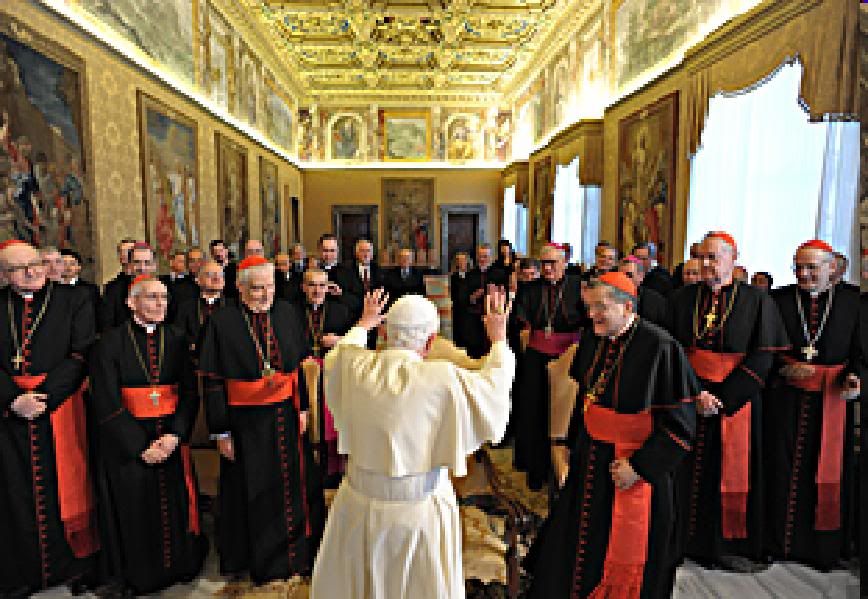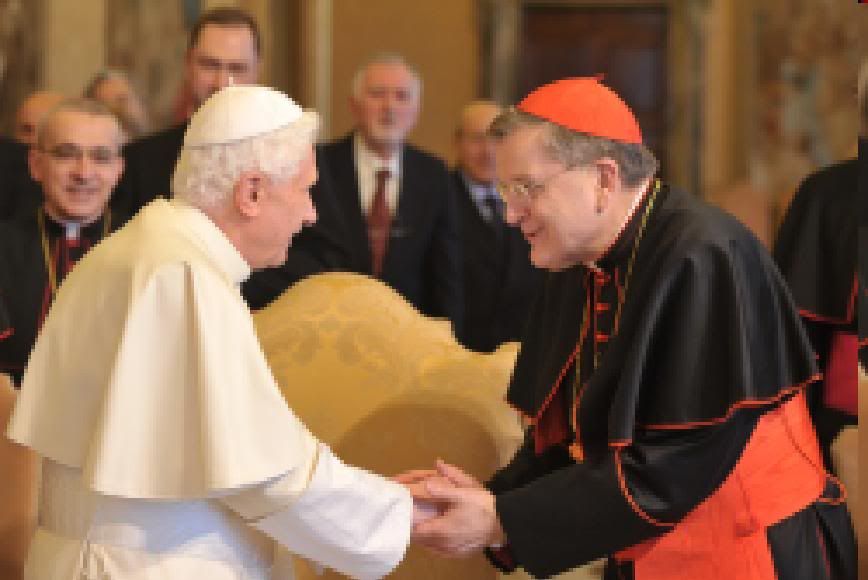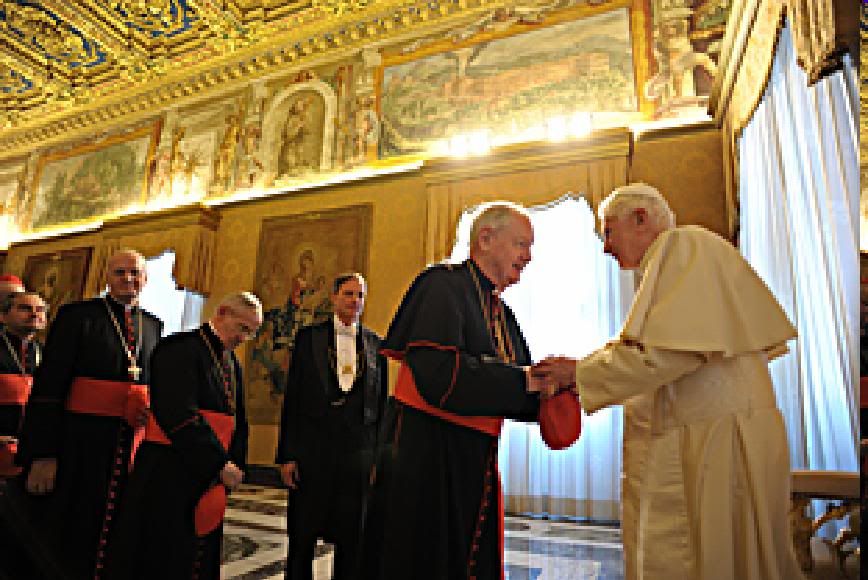 Pope to Apostolic Signatura:
Pope to Apostolic Signatura:
Justice is indispensable
to build a community of love


 The Holy Father greets Cardinal Burke.
The Holy Father greets Cardinal Burke.
04 FEB 2011 (RV) - Pope Benedict XVI received the officials and staff of the Apostolic Signatura – the Supreme Court of the Catholic Church - on Friday morning in the Consistory Hall of the Apostolic Palace.
Next to the Pope himself, the Supreme Tribunal of the Apostolic Signatura is the highest judicial authority in the Catholic Church, and is responsible for overseeing the administration of justice in whole Church.
The Signatura has final ordinary appellate jurisdiction in cases that involve conflicts between two or more Dicasteries, as well as appeals of administrative decisions.
With the oversight responsibility comes the power to extend the jurisdiction of local tribunals and to create inter-diocesan tribunals, as well as to grant dispensations from procedural laws, and discipline canon lawyers.
The Signatura is currently holding its Plenary Assembly, a new development that stems from a reform of the tribunal’s statutes, which Pope Benedict XVI signed in 2008.
At the start of the audience this Friday in the Apostolic Palace, at the Vatican, the current Prefect of the Signatura, the American Cardinal Raymond Leo Burke – the first non-European Prefect in the history of the Signaler – greeted the Holy Father in the name of all the participants in the Plenary.
In his remarks to the Signatura, the Holy Father spoke of the administration of justice as difficult, often delicate and demanding work, that requires particular intellectual and spiritual discipline that is an integral part of the Church’s mission in the world.
“The Pilgrim People of God on Earth,” said Pope Benedict, “will not ever be able to realize its identity as a community of love, if it does not have regard within itself for the exigencies of justice.”
Here is a translation of the Holy Father's address:
Eminences,
Venerated brothers in the Episcopate and Priesthood,
dear brothers and sisters:
First of all, I wish to extend my heartfelt greeting to the Prefect of the Apostolic Signatura, Cardinal Raymond Leo Burke, whom I thank for the greeting with which he opened this meeting.
I greet the other cardinals and bishops who are members of the Supreme Tribunal, the Secretary, the officials and all the co-workers who carry out the daily ministry of your dicastery. I also greet the Tribunal's experts and advocates.
This is the first opportunity for me to meet the Supreme Tribunal of the Apostolic Signatura after the promulgation of the {S]Lex propria which I signed on June 21, 2008. In the course of preparing this law, the desire was expressed by members of the Signatura to be able to dedicate - in the same way as every dicastery of the Roman Curia (cfr. Cost. ap. Pastor bonus, 28 giugno 1988, art. 11; Regolamento Generale della Curia Romana, 30 aprile 1999, artt. 112-117) - a periodic plenary congregation dedicated to the promotion of the correct administration of justice in the Church (cfr. Lex propria, art. 112).
The function of this Tribunal, in fact, does not end with the supreme exercise of the judicial function, but also includes, in the executive area, vigilance over the correct administration of justice in the Corpus Ecclesiae (body of the Church] (cfr. Cost. ap. Pastor bonus, art. 121; Lex propria, art. 32).
This entails, among others, as the Lex Propria indicates, the up-to-date collection of information on the status and activities of local tribunals through the annual report that each tribunal is required to send to the Apostolic Signatura; the presentation and elaboration of the data that come from these reports; the identification of strategies for evaluating the human and institutional resources in the local tribunals, as well as the constant exercise of addressing the moderators of the diocesan and inter-diocesan tribunals which institutionally have direct responsibility for administering justice on the local level.
This involves coordinated and patient work, aimed above all at providing the faithful with a correct administration of justice that is prompt and efficient, as I requested, in relation to matrimonial annulment, in the post-synodal apostolic exhortation Sacramentum caritatis:
"When legitimate doubts exist about the validity of the prior sacramental marriage, the necessary investigation must be carried out to establish if these are well-founded. Consequently there is a need to ensure, in full respect for canon law, the presence of local ecclesiastical tribunals, their pastoral character, and their correct and prompt functioning.
"Each Diocese should have a sufficient number of persons with the necessary preparation, so that the ecclesiastical tribunals can operate in an expeditious manner. I repeat that it is a grave obligation to bring the Church's institutional activity in her tribunals ever closer to the faithful"(No. 29).
On that occasion, I also referred to the instruction Dignitas connubii(the dignity of spouses), which provides to the Modarators and ministers of the tribunals, in the form of a vademecum, the necessary norms in order that cases of matrimonial annulment are treated and defined in the fastest and surest way.
The activity of this tribunal is aimed at assuring that the ecclesiastical tribunals are present in a territory and that their ministry is adequate for the rightful demands of speed and simplicity to which the faithful have a right in the treatment of their cases.
Under the tribunal's competence, such activity promotes the erection of inter-diocesan tribunals; provides prudently for any necessary exemptions from academic titles for the ministers of the tribunals, along with the prompt verification of their actual expertise in substantive and procedural law; grants the necessary exemptions from legal procedures when the exercise of justice in a particular case requires the relaxatio legis (relaxation of the law) in order to reach the outcome intended by the law. This, too, is an important task of discernment and application of procedural law.
Vigilance over the correct administration of justice would, however, be deficient if it does not also include the function of protecting correct jurisprudence (cfr. Lex propria, art. 111, §1).
The instruments of cognizance and intervention, granted to the Apostolic Signatura by the Lex Propria and by its institutional position, allow it an activity which, in synergy with the Tribunal of the Roman Rota (cfr. Cost. ap. Pastor bonus, art. 126), has proven to be providential for the Church.
The exhortations and the prescriptions with which this Apostolic Signature accompanies its responses to the annual reports of local tribunals not infrequently recommend to their respective Moderators both knowledge of and adherence to the directives proposed in the annual Pontifical addresses to the Roman Rota, as well as to the common Rotal jurisprudence on specific aspects which are urgent for the individual tribunals.
Therefore, I encourage reflection during your plenary meetings these days on the correct jurisprudence to propose to local tribunals on the question of error iuris (judicial error) as a reasons for matrimonial annulment.
This Supreme Tribunal is also involved, among other things, in another delicate area of the administration of justice, entrusted to you by the Servant of God Paul VI. The Tribunal is, in fact, aware of the controversy that arose from ecclesial administrative power that is deferred to as a legitimate recourse regarding single administrative acts emanating from or approved by dicasteries of the Roman Curia (cfr. Cost. ap. Regimini Ecclesiae universae, 15 agosto 1967, n. 106; CIC, can. 1445, § 2; Cost. ap. Pastor bonus, art. 123; Lex propria, art. 34).
This is a service of primary importance: the predisposition of instruments of justice - from the pacific settlement of controversies to their juridical coverage and definition - constitutes a space for dialog and renewal of communion in the Church.
While it is indeed true that injustice must be confronted above all with the spiritual weapons of prayer, charity, forgiveness and penitence, nonetheless the opportunity and the need to confront it with procedural instruments cannot be excluded in some cases.
These processes constitute, first of all, opportunities for dialog which often leads to agreement and reconciliation. It is not by chance that the procedural system provides that in limine litis (at the start of the procedure), or better yet, at every stage of the process, room and opportunity must be provided so that "every time someone considers himself unjustly burdened by a decree, there should be no dispute between him and the author of the decree, but they should both agree to find an equitable solution, by recourse to authoritative persons for mediation and study, so that controversy may be avoided or resolved in an appropriate manner" (CIC, can. 1733, § 1).
Also encouraged to this end are initiatives and standards aimed at instituting offices or councils, to be tasked, according to norms which will be established, with searching for and suggesting these equitable solutions (cfr. ibid., § 2).
In those cases when it is not possible to resolve a controversy peacefully, a legal administrative process must follow after judicial definition of the controversy. Even in such cases, the activity of the Supreme Tribunal must aim to reconstitute ecclesial communion, that is, the re-establishment of objective order for the good of the Church.
Only such a communion, re-established and justified by the reasons for the judicial decision, can lead to authentic peace and concord in ecclesial teamwork. This is the meaning of the famous principla, Opus iustitiae pax - the work of justice is peace.
The effortful re-establishment of justice is destined to reconstruct correct and orderly relationships among the faithful, and between them and the Church authority.
In fact, internal peace and the willing collaboration of the faithful in the mission of the Church derive from a re-established awareness of how to fully carry out one's vocation.
The justice that the Church seeks through any legal administrative process can be considered initially as the minimum requirement, as well as an expectation, of charity, which is indispensable, but insufficient at the same time, relative to the charity by which the Church lives.
Nonetheless, the People of God on their earthly pilgrimage cannot realize their identity as a community of love unless they also respect the demands of justice.
To the Most Blessed Mary, mirror of justice and Queen of peace, I entrust the valuable and delicate ministry that the Apostolic Signatura carries out in the service of communion within the Church, while I assure each of you of my esteem and appreciation.
On you and on your daily work, I invoke the light of the Holy Spirit, and I impart to everyone my Apostolic Blessing.

[Modificato da TERESA BENEDETTA 05/02/2011 13:59]